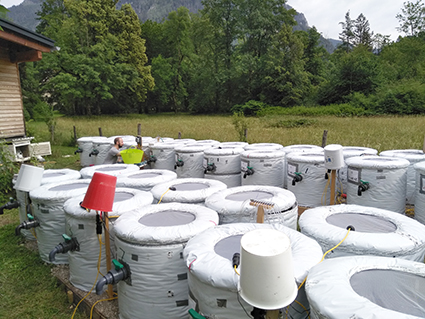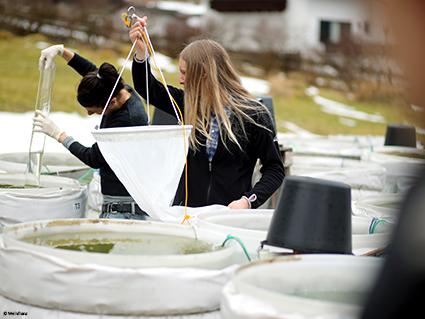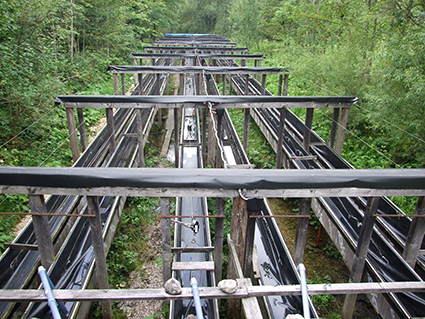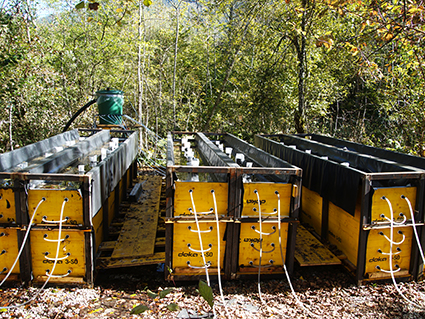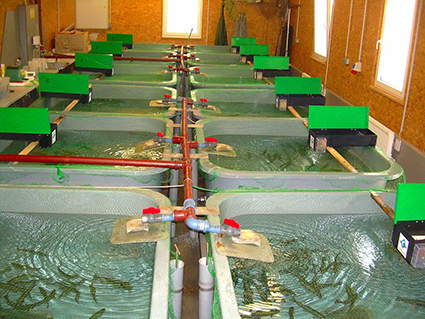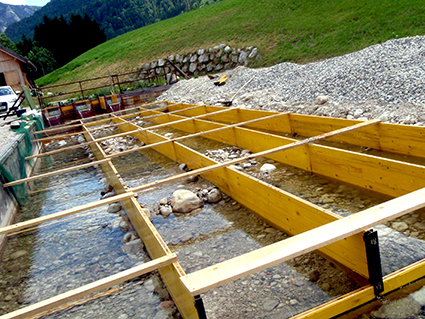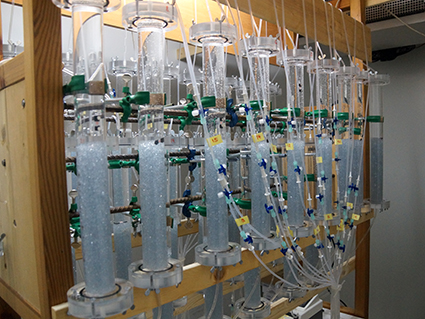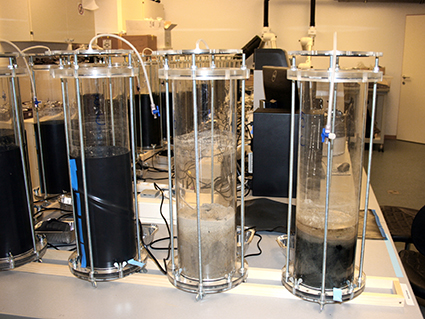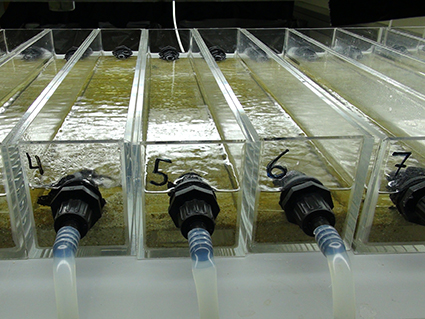OUT-DOOR FACILITIES
|
|
AquaScale mesocosmsResponsible: AquaScale, Robert Ptacnik Description: 40 land-based mesososms (320 L each); water pipes for aeration and mixing; exchangeable inner walls; app. 500 m from lake; can be inoculated with water from Lake Lunz or other sites; equipped with a special port to minimize sample contact Controlled parameters: connectivity; water temperature; light levels; nutrient levels & DOC Research Topics: diversity-functioning research and spatial insurance in plankton communities; functional diversity of plankton communities Accessible through transnational access of the project Aquacosm: https://www.aquacosm.eu/ |
|
|
LipTox mesocosmsResponsible: LipTox, Martin Kainz Description: 24 land-based mesososms (400 L each), filled with lake water from Lake Lunz, temperature controlled, aerated, temperature sensors, remote controlled Controlled parameters: Water temperature, air flow; DOM, nutrients Research topics: Effects of temperature, heat waves, light, brownification on phytoplankton and zooplankton biodiversity and biochemical composition (elemental stoichiometry, fatty acids); long-term feeding experiments, ecotoxicology and xenobiotics - producer - consumer interactions Accessible through transnational access of the project Aquacosm: https://www.aquacosm.eu/ |
|
|
Benthic flumesResponsible: CarboCrobe, Katrin Attermeyer Description: 6 streamside experimental flumes of 40m length (0.4 m wide), used in two operational modes, in flow-through mode with raw stream water to all flumes, or in recirculation mode, with separate recirculation for each flume. Controlled Parameters: Discharge (0 to ~7,5 L/s per flume), flow velocity, water level, slope, bed structure/ sediment composition, biofilm age (often co-variable), light/shading, nutrient status, additions of nutrients, DOM, soil etc. possible. Potentially water temperature can also be modified. Research Topics: Biofilm development, structures and processes Accessible through transnational access of the project Aquacosm: https://www.aquacosm.eu/ |
|
|
Hyporheic flumesResponsible: FLUVICHEM, Gabriele Weigelhofer Description: 6 stream side experimental flumes of 5m length, 0.5 m width, and 1 m depth; fed by oligotrophic stream water in flow-through mode; inlets and outlets at 5 different depth allow to manipulate water levels; Controlled Parameters: Discharge, groundwater flow velocity, hyporheic water level; bed structure/ sediment composition; additions of nutrients, and DOM possible. Research Topics: Hyporheic biofilm development, structures and processes; effects of intermittency Accessible through transnational access of the project Aquacosm: https://www.aquacosm.eu/ |
|
|
Fish labResponsible: LipTox, Martin Kainz Description: 12 in-door tanks; 1000 L each, source water supply ~1 L/sec for each tank; automatic feeders; light control Controlled parameters: light, water supply, fish feeds, fish taxa and density, feeding frequency Research Topics: Feeding experiments on different fish feeds, somatic development of fishes, fish growth experiments, dietary energy conversion (lipids/fatty acids in fish liver, brain, eyes, muscle tissues, and eggs) |
|
|
HyTec Flumes (Hydromorphology & Temperature
|
Video "Mesocosmos Lunz - and its facilities"
This video was produced throughout the Aquacosm-Plus Webinar 2020 about the topic science communication and shows two of the experimental facilities of WasseCluster Lunz. Here more information about the infrastructure of WasserCluster Lunz. |
|
|
IN-DOOR FACILITIES
Hyporheic upflow-reactors (32)
Description: Small tubes of acryl glass (0.5 m long, 4 cm inner diameter, transparent), connected to a peristaltic multi-channel pump; can be operated in circulation mode (airtight) or flow-through mode; filled with glass beads or fine sediments Controlled parameters: Discharge, nutrients, DOC Research topics: Effects of nutrients, DOC, intermittency, etc. on hyporheic metabolism, biofilm structures and processes, and DOM/nutrient uptake |
|
Soil/ sediment mesocosms (19)
Description: Large tubes of acryl glass (length 48 cm, inner diameter 14 cm), can be made air-tight for gas exchange; stainless steel collar for sampling undisturbed soils/sediment cores Controlled parameters: Water level, nutrients, organic matter Research topics: Effects of drying & re-wetting on nutrient and organic carbon cycling in soils/sediments; greenhouse gas emissions, isotope enrichment studies |
|
Experimental Flumes (>30)
Description: Flumes of acryl glass (length 0.5 m, width 7 cm, height 12 cm), operated in open recirculation mode by individual aquarium pumps Controlled parameters: light (LED stripes), nutrients/DOC, sediments Research topics: Effects of light, nutrients, DOM and intermittency on benthic processes under light and dark conditions |
|




